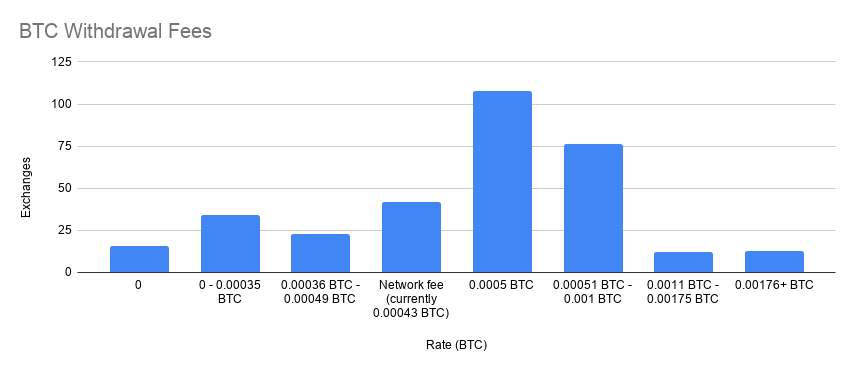As we at Cryptowisser.com have the world’s largest Exchange List and the world’s largest Derivatives Exchange List, where all information on fees is updated on a monthly basis, we feel that it is our duty towards the members of the crypto community to publish a study of what actually is the average crypto spot trading fee and the average crypto contracts trading fee. Consequently, we have created this report.
Summary of Report, Q4 2020
This particular report is our second full-blown empirical study. The first one, available here, was published on 31 October 2020. Compared to the first report, there are only miniscule changes in the average trading fees. We have also introduced a new fee group in the study: BTC-withdrawal fees.
Surprisingly enough, the average spot trading taker and maker fees both increased by 0.004% (taker fees from 0.213% to 0.217% and maker fees from 0.160% to 0.164%). The average contracts trading fees followed suit and increased with 0.007% for takers (from 0.057% to 0.064%), and 0.005% for makers (from 0.009% to 0.014%).
Average Spot Trading Fee
In our Exchange List, taker and maker fees are listed for 350 different spot trading exchanges. The taker fees range from nothing (there are 13 exchanges that have 0.00% as their taker fee) to 1.99% (American exchange Gemini). The maker fees range from -0.10% (Paymium, VALR and Cryptox), meaning that you get paid 0.10% of the order value if you are the maker, to 1.99% (again, American exchange Gemini).
The market average spot trading fee is 0.217% for takers and 0.164% for makers.*
The following bar chart shows the allocation of fees between the spot trading exchanges in the study:

Average Contracts Trading Fee
Out of the 41 exchanges offering contracts trading in the exchange list, the taker fees range from 0.03% (three exchanges, GMO Japan, Bitcoke and Xena Exchange) to 0.20% (American exchange dYdX charges 0.20% as their contracts trading taker fee).
Maker fees on the other hand, range from -0,025% (11 different exchanges have -0.025% as their contracts trading maker fee) to 0.10%. There was only one exchange charging 0.10% for makers: Delta Exchange, registered in Saint Vincent and Grenadines.
The market average contracts trading fee is 0.064% for takers and 0.014% for makers.
The following bar chart shows the allocation of fees between the contracts trading exchanges in the study:

Average BTC-withdrawal Fee
Out of the 324 exchanges we have been able to retrieve fixed BTC-withdrawal fees from, the withdrawal fees range from 0 (16 different exchanges) to 0.005 BTC (Lithuanian exchange BTC Exchange – which on the date of preparing this article (8 January 2021) corresponded to USD 206.78 and is an absolutely crazy fee).
Many exchanges don’t charge any fees at all, but when you withdraw from these exchanges, you still have to pay the network fees to the miners in the network. Accordingly, we have inputted the network fee (updated monthly) in our database as the withdrawal fee for such exchanges.
The average BTC-withdrawal fee is 0.000643 BTC per BTC-withdrawal.
The following bar chart shows the allocation of BTC-withdrawal fees in the study:

Concluding Thoughts
The previous report (Q3 2020) showed a decrease in fees, and we stated then that it was reasonable to believe that the fees will continue to decrease. Partly due to the growth of decentralized exchanges, as these normally charge much lower fees. Partly due to the increased competition among centralized exchanges.
The results we found in this report contradict the belief expressed above. It is not entirely clear what is the rationale behind the higher fees. One possible explanation, however, is that there has been a great surge in interest for purchasing cryptocurrency since the last report was published (31 October 2020), due to the soaring cryptocurrency prices during that period. In such a market climate, exchanges might have seen an opportunity to increase trading fees without losing any demand for their services. It should be noted though that the levels of increase in the exchanges’ average trading fees are quite marginal.
This report is the second report in Cryptowisser.com’s crypto trading fee report series, and the next report will be prepared and published in the beginning of Q2 2021.
* The following types of exchanges have been excluded from the calculations of spot trading fees, contracts trading fees and withdrawal fees:
(i) exchanges not offering spot trading, such as crypto stores, or market places where users can post ads for selling Bitcoins etc.,
(ii) exchanges where we have not been able to find unambiguous data on the relevant trading fees, and
(iii) exchanges that were not in operation on 31 October 2020.
Furthermore, the trading fees used for the calculation are always excluding any and all discounts based on trading volume or holdings of an exchange’s native token etc.
** The following groups of withdrawal fees have been excluded from the calculations:
(i) percentage based withdrawal fees;
(ii) hybrid models (where one part of the withdrawal fee is percentage based and another part of the withdrawal fee is a fixed cryptocurrency amount)
 Richard
Richard







